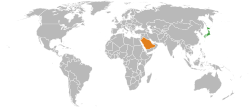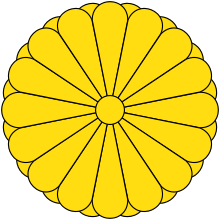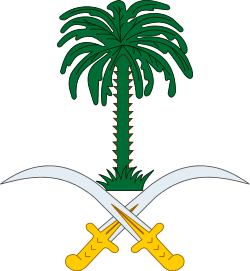Japan–Saudi Arabia relations
 |
|
Japan |
Saudi Arabia |
|---|---|
Japan–Saudi Arabia relations refer to foreign relations between Saudi Arabia and Japan. Official relations between the two nations were established in 1955.
The first official contacts between the two nations occurred in 1938 when Saudi envoy to the United Kingdom, Hafiz Wahba, visited Japan to attend the opening of the Tokyo Mosque. In the following year the Japanese envoy to Egypt, Yokoyama, visited Saudi Arabia and met with Ibn Saud of Saudi Arabia in Riyadh.
In 1953 the Japanese government sent its first delegation to the UK Economic and accelerated the process to culminate in the establishment of diplomatic relations between the two countries in 1955, and passed the economic relations between the two countries, an important station in the year 1957 as the Kingdom was granted the right of privilege to explore for oil It's a Japanese Arabian Oil Company.
In 1960, His Royal Highness Prince Sultan bin Abdul Aziz, Crown Prince, Deputy Prime Minister and Minister of Defense and Aviation and Inspector General, Kln, when the then Minister for Transport Minister to visit Japan.
And strengthened bilateral relations after the visit of King Faisal bin Abdul Aziz, to Tokyo in 1971 to launch the most important stage in the history of Saudi-Japanese relations, which has seen many of the mutual visits of officials of the two countries.
And strengthened the bonds of relations between the Saudi royal family and the Japanese imperial family through these visits. Was the Crown Prince of Japan at the time Okhito Prince and Princess Michiko Lole Covenant, a visit to the Kingdom in the year 1981.
And on behalf of the Custodian of the Two Holy Mosques King Fahd bin Abdul Aziz was attended by His Royal Highness Prince Nawaf bin Abdul Aziz, crown emperor decrees year 1990, and in 1994 the Crown and the parent in Japan during a visit to the Kingdom.
In 1997, Ryutaro Hashimoto visited the Prime Minister of Japan at that time as part of the Kingdom of the Custodian of the Two Holy Mosques King Fahd bin Abdul Aziz.
In the month of October of the year 1998, he visited the Custodian of the Two Holy Mosques King Abdullah bin Abdul Aziz, Japan, when he was crown prince, and Saudi Arabia signed the agenda of cooperation with Japanese Prime Minister Keizo Obuchi, was His Royal Highness Prince Salman Bin Abdul Aziz, Emir of Riyadh region, had visited Japan in April of the same year.
In the year 2001 and visited the Japanese Foreign Minister Yohei Kono announced the UK initiatives in three areas; the promotion of dialogue among civilizations with the Islamic world and the development of water sources, and multi-wide political dialogue.
Economic relations
These special relations between the Kingdom and Japan have been translated on the ground and the special district is the economic reality of Japan finished second in the list of the most important trading partners of the Kingdom, with exports of 52,394 million Saudi riyals and imports of 91,341 million riyals in 2003.
In the area of the joint projects of the size of Saudi-Japanese joint projects in the Kingdom of 74 projects including 41 industrial projects, and (33) non-industrial projects with a capital of 67.45622 million representing the share of the Saudi side of the 70.74% and the Japanese side 05,25% and the rest to other investors, or 34.0%.
The two countries have signed an agreement on economic and technical cooperation from the year 1975, which also included the establishment of Saudi-Japanese Joint Committee to monitor the implementation of the terms of the agreement between the two countries.
The visit by the Custodian of the Two Holy Mosques King Abdullah bin Abdul Aziz when he was crown prince to Japan, one of the most important stations in the history of relations between the two countries, especially economic and technical as it was signed during the visit a joint declaration on cooperation between the UK and Japan for the atheist and the era of the twentieth century, which included Many of the pillars, which included confirmation of the leaderships of the two countries and their commitment to do their utmost to implement the program of joint cooperation and stressed the importance of the role of the private sector in promoting bilateral economic ties and agreed on the need to encourage and facilitate cooperation in the private sector in both countries in addition to the importance of cooperation for the development of trade relations and investment in the oil .
Was also signed to the program of joint cooperation between the UK and Japan, which includes the formation of four task forces, as well as the Joint Declaration for Cooperation in the field of Youth, Sports and Culture between the Government of the Kingdom, and Japan were also planning a visit to a delegation of Saudi businessmen to Japan aimed at the definition of export potential and capacity of the Kingdom and the opportunity to invest and establish projects involved, incentives and facilities available in this regard and strongly urged them to increase imports from the UK, and has been making an exhibition in Saudi Arabia in Tokyo and Osaka in 2000, was also signed in the same year on the bilateral agreement to open markets in goods and services with Japan.
Cup of Japanese Ambassador
On 3 May, “the Cup of Japanese Ambassador” of Karate was jointly organized by the Embassy of Japan in Saudi Arabia and the Karate Federation in Saudi Arabia. A trophy and medals were awarded to the winners by H.E. Mr. Shigeru Endo,Ambassador of Japan to the Kingdom of Saudi Arabia. With the attendance of Mr. Ibrahim Abdulrahman, Vice President of Saudi Arabian Karate Federation, Mr. Humud bin Saud, Secretary General of Saudi Arabian Karate Federation and many Saudi people, this championship contributed to promoting the sports exchanges between Japan and Saudi Arabia.Embassy's Highlights 2012

